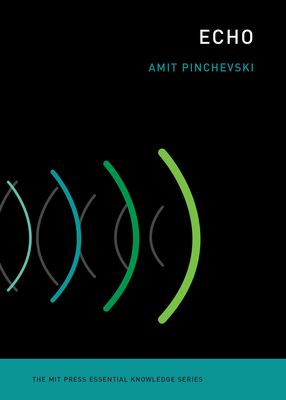ECHO – Amit Pinchevski. Cambridge, MA: MIT Press, 2023
By Mark Peter Wright
Full disclosure: I love echoes. Like many soundies, I will come to a sudden halt under a bridge to listen to the space. I will sit for an extended period of time to hear the cacophony of construction work as it bounces back from walls. I will tap and knock materials in space to audition and resound that space and my relation to it. Echoes are invitations to hear beyond the singular, to orientate our relationship to place, and to appreciate that time and space are haunted by the past and possible future.
Amit Pinchevski’s latest book, ECHO (MIT Press, 2023), examines echo and echoing, across historic and contemporary literature, culture and myth, philosophy, technology, and social media. Nested throughout is a sustained argument that echo is more than repetition; it is an agential medium that can blur divisions of nature and culture. Early in the book, Pinchevski offers a definition: “echo is response plus repetition, but the response is invariably delayed and the repetition is often partial or varied. Not all responses are repetitions, and not all repetitions are responses” (p.9). Pinchevski stresses how an echo is different to terms such as “reflection”, “reverberation”, and “resonance” through a media philosophical enquiry that argues echo as an intermediary event which crosses back and forth between the human and nonhuman, public and private, inhabitant and environment: “it is by virtue of its intermediary position – being in and of the middle – that echo can act as a medium, that is connecting heterogeneous domains.” (p.53).
ECHO is part of the Essential Knowledge Series from MIT Press, where authors dive deep into one specific topic. It is the perfect format for Pinchevski’s echoing thoughts. Over eight brisk chapters of this pocket-sized book you will encounter a wide range of contexts, including literature and myth (Echo and Narcissus), physics and acoustics, etymology, animals and media among others.
The book sits within the field of sound studies by way of its interrogation of a sonic phenomenon and its connection to culture. It contributes to a web of literature exploring the echo, such as Annie Goh’s feminist and decolonial reading via archaeoacoustics (2017) and Louis Chude-Sokei’s examination of echo and dub via music, diaspora and technology (2018). Pinchevski stays within sound studies and does not veer into practice. If, like me, you appreciate practice-based artworks to think-with, I would recommend Davide Tidoni’s balloon-bursting spatial praxis as the perfect companion.
Chapter 6, “Echo Techniques” is as close as we get to practice via a methodological exposé of echolocation in bats and sonar. Perhaps one of the book’s most compelling sections is Pinchevski’s examination of “echo rhetoric” and “echo chambers”. He begins with Dr Martin Luther King’s famous speech I Have a Dream (1963), breaking down the rhetorical device of echo via the phrase “free at last, free at last, thank God almighty, we are free at last.” To effectively use repetition as a method for echoing, Pinchevski reminds us that, in speech, there is a fine balance between too little and too much. Echoing, as a device, can “signal importance and recognition, but should be exercised with caution” (p.86).
Too much echoing, and emotional, intellectual, and political meaning evacuate the room. We are left with “echo chambers”, a catch-all phrase used to imply inertia and circular speech acts devoid of real-world application. For Pinchevski, social media is an echo-site of study. In a world of hashtags and retweets, the veracity of a message is perhaps more at stake than ever. When fake news echoes, how do we remain tethered to a sense of truth without succumbing to the power of one knowledge-maker? Pinchevski states: “while ostensibly repeating the same thing, echoing actually brings out the changing conditions of uttering and in doing so, makes the original message susceptible to new meanings” (p.101).
There is an ethics to echo and echoing. Further to initiating a relationship and response, echo brings a certain responsibility to the source, or perhaps more accurately, the memory of an echo. The challenge, therefore, is how one hears echoes in relationality rather than detached objects in and of themselves. Hence, the book prompted me to consider academic citation as a practice of echoing: a generous ripple that works toward collaboration rather than single origin points. To my mind, citation echoing might be something like what Katherine Mckittrick achieves in her incredible book Dear Science and Other Stories (2021).
For such a compact book, ECHO offers a long read. It is bursting with ideas and references for sound studies scholars with a particular interest in literary studies as well as media and biology scholarship. Pinchevski iterates his thinking over a huge terrain, which at times can feel exhausting, but one can always pause and delve back in again; such is the nature of a pocketbook. Or perhaps one can practice-with the book by taking it outdoors to read aloud under bridges and archways.

